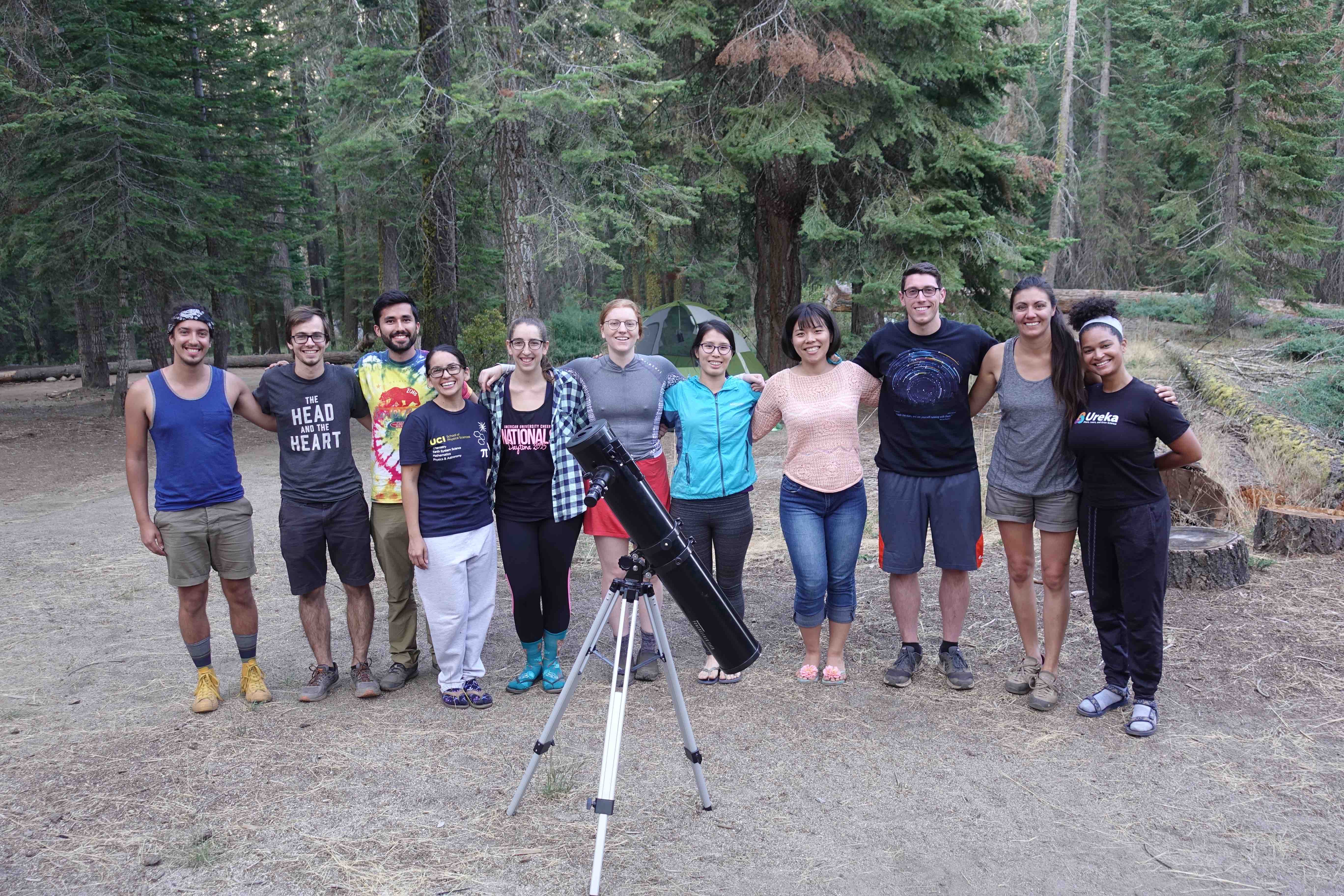
What is the Sierra Conference?
A traditional gathering of astronomy graduate students from the University of California that has been happening for over 50 years. It is part scientific conference, part camping retreat. It is a meeting organized by graduate students for graduate students, to encourage collaboration and networking within the astronomy community in California. The conference features discussions on astronomical research, graduate student life, department climate, and professional development in addition to plenty of time to explore the great outdoors with your peers/friends/collaborators. It is an opportunity to meet students from other departments in our same UC system, talk about our experiences and science, grow our community, and enjoy the natural beauty of our state.
Who can attend?
All UC astronomy graduate students, including incoming/outgoing students.
Where does it take place?
Traditionally, the conference's home is the California Sierra Nevada mountain range (hence its name). Usually, this means we gather at a campsite in Sequoia or Kings Canyon National Parks. Not only is this one of the most beautiful areas in the state, it also happens to be a convenient, close to central location for all UC campuses.
Why should I attend?
- It is a special and memorable experience unlike any other conference you might ever attend.
- You will have fun, meet your peers, and learn from them.
- You are probably eager to get out of the house and meet new friends after so much time at home.
- Most of the conference costs are covered by our sponsors!
FAQs
- Will there be any COVID-related protocols?
We are requiring that all participants be fully vaccinated (2 weeks after final shot) by the first day of the conference. We are also asking for proof of a negative COVID-19 test result within one week of the conference (both rapid tests and PCR tests are accepted). We are adhering to the recommendations of the CDC and California Department of Public Health which allow unmasked outdoor gatherings of this size for fully vaccinated people. It is still recommended to bring a mask to the conference in case of special situations (e.g. taking public transport within the national park to get to a trailhead).
- What is the schedule like?
This year we have a campsite booked from Friday to Monday. Friday is the nominal arrival date, so there are no group events planned other than an icebreaking activity to meet everyone. Saturday and Sunday are the main conference dates. In the mornings we have science presentations. After that, most of the day is open for recreational activities like hiking, swimming, rock climbing, relaxing, etc. depending on what people want to do. We meet back up at the campsite for dinner and then have our evening discussions, usually around the campfire. We discuss topics related to being a grad student in astronomy from the different perspectives of each campus and we plan out projects to collaborate on. Monday is the departure day, so there is nothing planned. See the schedule here.
- How will we share our research in the forest?
After registration, we will be collecting 1 page "mini slides" and abstracts from each participant to include in a conference booklet (see examples in the History page). During our science presentations, attendees will talk about what they submitted guided by these booklets. We will have printed copies to share. It will be very informal, and only lasting a few minutes per person with an extra minute for questions. There will be plenty of time throughout the rest of the weekend to have smaller more detailed discussions if there was something you found particularly interesting.
- I've never camped before, can I still go?
YES! There is usually a range in experience among attendees, from hardcore backpackers to first time campers. All are welcome and we can help you prepare however you need.
- Will I have to pay?
Thanks to our sponsors, there is no registration fee and you do not have to pay for the conference itself. Additionally, there are some funds available to cover park entrance fees and help subsidize gas costs. However, costs for food and other supplies are not covered. Typically, attendees from a single campus will plan out meals and supplies together and split the costs. Some attendees have been successful in asking their department or grad student association for funds to help cover these expenses. This approach is highly encouraged! Feel free to reach out to the organizers if you have questions about this.
- No one else from my campus is going, but I still want to attend.
Great! Nothing to worry about, this situation has happened in the past. Definitely reach out to one of the organizers so that we know your situation and can help you prepare and perhaps coordinate with another campus.
- Can I bring my family / significant other?
While the general preference is for the conference to be grads only, we are willing to make exceptions. If your attendance is conditional on being able to bring a significant other / family, then we will definitely welcome them so that you can attend. We want to allow as many grads as possible to join. In the past we have had family members join us. Please let us know if that is your situation.
- How can I get involved with organizing?
Reach out to your local campus point person and they can add you to our organizational google group!
- What is the significance of "Osterbrock" in the name?
When the conference was revived in 2018, it was made possible by a grant provided the Donald and Irene Osterbrock Leadership Program at UC Santa Cruz. The program has continued to provide financial support for the conference in 2019 and 2021, and it has also been part of our name.
